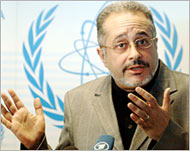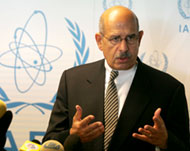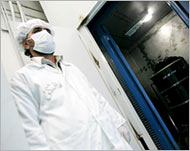Iran rejects IAEA resolution
Iran has rejected as unacceptable an IAEA resolution asking that it stop uranium conversion.

The UN nuclear watchdog agency’s 35-nation board on Thursday adopted a resolution expressing “serious concern” over Iran’s resumption of uranium conversion and asked it to stop.
“The resolution on Iran was just adopted without a vote by
consensus, full consensus. All 35 members of the board agreed
the language of the resolution text,” IAEA spokeswoman Melissa Fleming told reporters.
The resolution said “outstanding issues relating to Iran’s nuclear programme have yet to be resolved, and that the agency is not yet in a position to conclude that there are no undeclared nuclear materials or activities in Iran.”
It expressed “serious concern” over the government’s resumption of uranium conversion at its nuclear facility in Isfahan, saying the move “underlines the importance of rectifying the situation … and of allowing for the possibility of further discussions in relation to that situation.”
However, the resolution noted that in 2004, the International Atomic Energy Agency(IAEA) found that “all the declared nuclear material in Iran had been accounted for, and that such material had not been diverted to prohibited activities.”
The resolution did not mention reporting Iran to the UN Security Council, which has the power to impose crippling sanctions.
Reaction
|
“Fortunately, Iran will not bend. Iran will be a nuclear fuel producer and supplier within a decade” Sirus Nasseri, |
Iran reacted with indignation to the resolution. “It is evident that the motive is to apply pressure,” said Iran’s chief IAEA delegate, Sirus Nasseri.
“Fortunately, Iran will not bend. Iran will be a nuclear fuel producer and supplier within a decade.”
Tehran saw the text as unacceptable because it would bar it from enriching uranium and other related activities that it is allowed to pursue under the Nuclear Nonproliferation Treaty, Nasseri said.
“All Iran wants to do is to enjoy the right under the NPT, the right which has been denied to it for more than two decades -a denial that has been firm and decisive,” he said.
“We do not accept this resolution and will not execute it. There are serious legal problems with this resolution and … we
are not obligated to implement it,” Mohammad Saeedi, deputy head of Iran‘s Atomic Energy Organisation, told state television.
Suspension
“There is no doubt that the uranium conversion facility in
Isfahan will continue operating, and we will continue relations
with the agency and we will welcome inspections,” Saeedi said.
Nasseri told reporters that “operations in Isfahan will continue
under full-scope safeguards” and that Iran was fully within its
rights.
He said Iran would maintain its suspension of enrichment
activity at another facility, in Natanz, “to keep the door open for negotiations.”
 |
|
Nasseri said resolution was |
“This resolution is political,” said Iranian Foreign Ministry spokesman Hamid Reza Asefi. “It comes from American pressure … It lacks any legal or logical basis and is
unacceptable.”
With this resolution, the three European nations Germany, Britain and France have violated the spirit and basis of the negotiations of the past two years, Asefi said.
“Considering that Iran has not swayed from its peaceful
intentions and has acted under the monitoring of the
agency, the passing of this resolution cast serious doubts
on the independence of the agency,” he said.
Compliance report
The agency’s board asked IAEA chief Mohamed ElBaradei to provide it with a comprehensive report on Iran’s compliance with an agency safeguards agreement by 3 September.
“With regards to the country as a whole, the jury is still out,” ElBaradei said.
“I can only see one best way to move forward, and that is through negotiations,” he said. “At the end of the day, I need to see defusion of the situation … that we are moving on a path of accommodation and not confrontation.”
Gregory Schulte, the US envoy to the IAEA, told reporters that the resolution “shows that the international community is united in its determination that Iran move off the dangerous course that it is on.”
Britain’s Foreign Office said in a statement: “We have got a strong, consensus-based IAEA resolution just as in the past. This sends a clear message to Iran of what it must do. We still believe there is a nonconfrontational way forward if Iran wants to take it.”
Enriched uranium can be used to produce energy or to make weapons, depending on the degree to which it has been enriched. During the meeting, Iran said it would keep its enrichment programme suspended.
Uranium enrichment
 |
|
ElBaradei to submit compliance |
But ElBaradei said the board also called on it to abandon its uranium conversion activities, a process that precedes enrichment in the early stages of the nuclear fuel production cycle.
“There is no urgent need to have conversion at this point,” ElBaradei said. Iran insists its nuclear programme is peaceful and geared only toward producing electricity. The United States and others contend it is covertly trying to build atomic weapons.
Negotiations on how to respond to Iran’s action started on Tuesday when the board met for an emergency session.
Reflecting divisions within the board on how to handle Iran, the Non-Aligned Movement – a group of mostly developing nations, some of which have their own nuclear programmes – urged the agency to draw a distinction between voluntary suspensions and legal obligations.
“The crux of the matter in moving towards any resolution, the international community must clearly distinguish between confidence-building measures and safeguards obligations,” the group said in a statement.
European Union envoys said in a statement that “the Iranian nuclear issue arose from failures to comply with legal obligations stemming from a treaty which is crucial to collective arrangements for maintaining peace and security.”
“The Iranian nuclear issue is therefore a global peace and security issue, not a private quarrel between the EU and Iran,” it said.
Persuasion
Negotiators have sought to persuade Iran to give up aims of producing its own nuclear fuel for its programme. “No one here is suggesting that there should be one rule for EU member states and another for developing countries,” the EU statement said.
Many EU countries that are dependent on foreign nuclear power plant fuel have “found this a cost-effective way of meeting their needs,” it added.
 |
|
On Wednesday, Iran removed |
Although the IAEA board had the power to report Tehran to the Security Council, diplomats had made clear they were not considering that step – widely seen as a last resort – and instead were holding out hope for a negotiated end to the standoff.
On Wednesday, agency inspectors watched as Iranian workers removed IAEA seals at the plant in Isfahan. Workers were set to resume the final steps of conversion. Some conversion activities were resumed on Monday.
In the past, the IAEA board has said the suspension was a voluntary but necessary confidence-building measure to alleviate concerns about Iran’s nuclear programme.
“This should (in) no way be seen as an endorsement,” IAEA spokeswoman Melissa Fleming said of the removal of the seals. A surveillance system allowing the agency to keep track of nuclear material at the plant had been installed, she said.
On Saturday, Tehran rejected a European offer of economic and political incentives, but has said it still wanted to continue with the talks, expected to continue later this month.